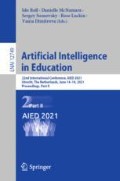Abstract
Knowledge tracing—where a machine models the students’ knowledge as they interact with coursework—is a well-established area in the field of Artificial Intelligence in Education. In this paper, an ensemble approach is proposed that addresses existing limitations in question-centric knowledge tracing and achieves the goal of predicting future question correctness. The proposed approach consists of two models; one is Light Gradient Boosting Machine (LightGBM) built by incorporating all relevant key features engineered from the data. The second model is a Multiheaded-Self-Attention Knowledge Tracing model (MSAKT) that extracts historical student knowledge of future question by calculating their contextual similarity with previously attempted questions. The proposed model’s effectiveness is evaluated by conducting experiments on a big Kaggle dataset achieving an Area Under ROC Curve (AUC) score of 0.84 with 84% accuracy using 10fold cross-validation.
Access this chapter
Tax calculation will be finalised at checkout
Purchases are for personal use only
References
Zhao, J., Bhatt, S., Thille, C., Zimmaro, D., Gattani, N.: Interpretable personalized knowledge tracing and next learning activity recommendation. In: Proceedings of the Seventh ACM Conference on Learning@ Scale, pp. 325–328 (2020)
Sonkar, S., Waters, A.E., Lan, A.S., Grimaldi, P.J., Baraniuk, R.G.: qDKT: question-centric deep knowledge tracing. arXiv preprint arXiv:2005.12442 (2020)
Pardos, Z.A., Heffernan, N.T.: Modeling individualization in a Bayesian networks implementation of knowledge tracing. In: De Bra, P., Kobsa, A., Chin, D. (eds.) UMAP 2010. LNCS, vol. 6075, pp. 255–266. Springer, Heidelberg (2010). https://doi.org/10.1007/978-3-642-13470-8_24
Lee, J.I., Brunskill, E.: The impact on individualizing student models on necessary practice opportunities. International Educational Data Mining Society (2012)
Khajah, M., Wing, M., Lindsey, R., Mozer, M.: Integrating latent-factor and knowledge-tracing models to predict individual differences in learning. In: Educational Data Mining 2014. Citeseer (2014)
Piech, C., et al.: Deep knowledge tracing. In: Advances in Neural Information Processing Systems, pp. 505–513 (2015)
Wang, Z., Feng, X., Tang, J., Huang, G.Y., Liu, Z.: Deep knowledge tracing with side information. In: Isotani, S., Millán, E., Ogan, A., Hastings, P., McLaren, B., Luckin, R. (eds.) AIED 2019. LNCS (LNAI), vol. 11626, pp. 303–308. Springer, Cham (2019). https://doi.org/10.1007/978-3-030-23207-8_56
Su, Y., et al.: Exercise-enhanced sequential modeling for student performance prediction. In: Proceedings of the Thirty-Second AAAI Conference on Artificial Intelligence, vol. 32, no. 1 (2018)
Zhang, J., Shi, X., King, I., Yeung, D.Y.: Dynamic key-value memory networks for knowledge tracing. In: Proceedings of the 26 International Conference on World Wide Web, pp. 765–774 (2017)
Ke, G., et al.: LightGBM: a highly efficient gradient boosting decision tree. Adv. Neural Inf. Process. Syst. 30, 3146–3154 (2017)
Pandey, S., Karypis, G.: A self-attentive model for knowledge tracing. arXiv preprint arXiv:1907.06837 (2019)
Kaggle Homepage. https://www.kaggle.com/c/riiid-test-answer-prediction/data/. Accessed 25 Nov 2020
Friedman, J.H.: Greedy function approximation: a gradient boosting machine. Ann. Stat. 29, 1189–1232 (2001)
Author information
Authors and Affiliations
Corresponding author
Editor information
Editors and Affiliations
Rights and permissions
Copyright information
© 2021 Springer Nature Switzerland AG
About this paper
Cite this paper
Zia, A., Nouri, J., Afzaal, M., Wu, Y., Li, X., Weegar, R. (2021). An Ensemble Approach for Question-Level Knowledge Tracing. In: Roll, I., McNamara, D., Sosnovsky, S., Luckin, R., Dimitrova, V. (eds) Artificial Intelligence in Education. AIED 2021. Lecture Notes in Computer Science(), vol 12749. Springer, Cham. https://doi.org/10.1007/978-3-030-78270-2_77
Download citation
DOI: https://doi.org/10.1007/978-3-030-78270-2_77
Published:
Publisher Name: Springer, Cham
Print ISBN: 978-3-030-78269-6
Online ISBN: 978-3-030-78270-2
eBook Packages: Computer ScienceComputer Science (R0)

